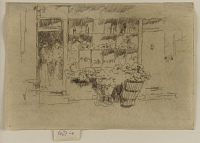Etchings Institutions search term: hogarth club
Little Greengrocer's Shop, Chelsea | ||
| Number: | 264 | |
| Date: | 1886 | |
| Medium: | etching and drypoint | |
| Size: | 71 x 103 mm | |
| Signed: | butterfly at right | |
| Inscribed: | no | |
| Set/Publication: | no | |
| No. of States: | 2 | |
| Known impressions: | 7 | |
| Catalogues: | K.259; M.255; W.210 | |
| Impressions taken from this plate (7) | ||
TECHNIQUE
It is basically an etching, with drypoint shading added in the second state. It was drawn with quick, expressive broken outlines and short curves, and vigorously shaded with diagonal and zigzag lines, reinforced by patches of drypoint shading. Abrupt, radiating lines indicate bunches of vegetables and jagged, bouncing lines, other miscellaneous fruit and vegetables. The figures are lightly etched and featureless - the shop-window has more character and detail than the figures.
PRINTING
Messrs Dowdeswell, after consulting the newly published catalogue by Frederick Wedmore (1844-1921), requested impressions of a number of etchings in February 1887. 12 By 8 February Whistler was at work printing the copper plates to satisfy their order. He printed three impressions of 'Greengrocer' on 4 September 1887. 13
The first state was printed in dark brown ink on laid paper ( ), the second in brown ink on buff laid Asian laid paper (
), the second in brown ink on buff laid Asian laid paper ( ) and ivory western laid (
) and ivory western laid ( ) and in dark brown ink on ivory laid paper (
) and in dark brown ink on ivory laid paper ( ). Impressions of the second state were trimmed to the platemark and signed on the tab with a butterfly and 'imp.' to show that Whistler had printed them.
). Impressions of the second state were trimmed to the platemark and signed on the tab with a butterfly and 'imp.' to show that Whistler had printed them.
The first state was printed in dark brown ink on laid paper (
 ), the second in brown ink on buff laid Asian laid paper (
), the second in brown ink on buff laid Asian laid paper ( ) and ivory western laid (
) and ivory western laid ( ) and in dark brown ink on ivory laid paper (
) and in dark brown ink on ivory laid paper ( ). Impressions of the second state were trimmed to the platemark and signed on the tab with a butterfly and 'imp.' to show that Whistler had printed them.
). Impressions of the second state were trimmed to the platemark and signed on the tab with a butterfly and 'imp.' to show that Whistler had printed them.
